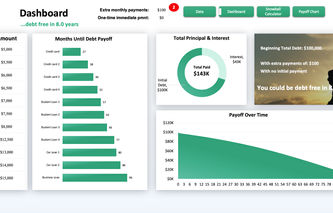Strapped for cash? You’re not the only one—
A 2021 survey found that 51.3% of Americans have taken out a loan in their lifetime. That’s about 131 million who also found themselves in a tight spot.
While applying for an installment loan isn’t anyone’s first option, it can certainly help ease the financial strain many of us have experienced.
How installment loans work
How to find the best installment loan for you
What you need to apply for an installment loan
A breakdown of the pros and cons
Best Installment Loans 2023
To help you find the best loan, check out our carefully curated list of recommendations for quick online installment loans—
Upgrade
Lending Club
Best Egg
Prosper
Lending Point
Marcus by Goldman Sachs
SoFi
Lightstream
Our Top Pick: Upgrade
APR: 7.96–35.97%
Loan amount: $1k–$50k
Loan term: 2–7 years
Minimum credit score: 560
Origination fee: 1.85–8.99%
Why we love it
Upgrade gives you access to fast loans, as quickly as one day after application approval, alongside low fixed rates. Loans can be used for various personal reasons, but you can also use the loan to cover any business expenses. After receiving your loan, if you’re in a rush to pay it off, there are no prepayment fees to catch you out.
Upgrade also offers a handy mobile app and Credit Health tool, so you can track your balance and make payments—all without even getting out of bed.
What to look out for
APR rates can differ depending on your credit score, credit history, and loan term—those with higher credit scores will likely receive a lower APR.
Be sure to make timely payments, as Upgrade will charge a $10 fee if your payment is 15 days late or not paid at all. Autopay users will also lose out as there’s no discount available.
APR: 8.30–36%
Loan amount: $1k–$40k
Loan term: 3–5 years
Minimum credit score: 600
Origination fee: 2–6%
Why we like it
It’s always nice to have some variety, and Lending Club delivers by offering personal loans, balance transfer loans, and auto loans. They also permit joint applications and several perks if you sign up as a member.
The Lending Club offers a generous 15-day grace period if you fail to make your payment on time—helping to ease some pressure from the repayment process.
What to look out for
In comparison to other loan amounts, Lending Club has a lower limit of $40k. So, if you’re looking for a larger loan to pay off over a longer period, you may be better off with one of our other options.
While not a huge difference, it’s also worth noting that the APR rates are slightly higher than the other options on our list. Although, you’re likely to get a lower APR with a good credit score.
APR: 7.99–35.99%
Loan amount: $2–$50k
Loan term: 3–4 years
Minimum credit score: 600
Origination fee: 0.99–8.99%
Why we like it
Best Egg covers a pretty flexible loan amount range, so it’s a good fit for those wanting both smaller and larger loans.
After application approval, Best Egg will deposit your loan quickly within 1-3 business days, although half of their customers will likely receive their loan the next day. If you’re keen to pay your loan off early, you’ll also be happy to know that there are no prepayment penalties.
What to look out for
You may not be charged for prepayment, but you will get charged for late payments—$15 if you’re over three days late.
Be wary of origination fees as well, as they can differ depending on your loan term. Likewise, your loan amount, APR, and loan term can depend on your creditworthiness, income, and debt payment obligations.
APR: 7.99–35.99%
Loan amount: $2k–$50k
Loan term: 3–5 years
Minimum credit score: 560
Origination fee: 1–5%
Why we like it
When compared to other top lenders, Prosper stands out for having a relatively low minimum credit score requirement—even catering to those with poor credit. You’ll get your loan within three business days if your application is approved.
Prosper also doesn’t charge any prepayment fees, so you’re free to pay off your loan early and cut down your rates.
What to look out for
Like most lenders, they set your APR rates after taking your creditworthiness, loan terms, and Prosper’s own rating into account. Origination fees can also vary from as little as 1% up to 5%.
If you’re tempted to opt for Prosper due to the minimum credit score requirement, be aware that your APR rate will likely be higher if you have a poor credit score.
APR: 7.99%–35.99%
Loan amount: $2k–$36.5k
Loan term: 2–6 years
Minimum credit score: 600
Origination fee: 0–6%
Why we like it
Lending Point is another one that will appeal to those will low credit scores. Despite their minimum requirement being 600, they’ve been known to go down to 590.
However, the catch is you’ll likely receive greater interest rates, which are pretty high compared to other lenders. Once you receive your loan approval, you should get your money the next business day. If you’re eager to pay off your loan, Lending Point won’t charge you prepayment fees.
What to look out for
As always, the loan conditions depend on several factors, such as your credit score, financial background, and Lending Point’s own scoring system. Regarding income, you must have a minimum of $350,000 to be eligible for the loan.
Origination fees can also differ depending on which state you live in. And for those living in Nevada or Virginia…well, you’re out of luck, as Lending Point doesn’t cover these states.
APR: 6.99–24.99%
Loan amount: $3.5k–$40k
Loan term: 3–6 years
Minimum credit score: 660
Origination fee: No fee
Why we like it
Marcus by Goldman Sachs stands out for having no origination fees, late fees, and no prepayment fees. Not only that, but you can also save money on rates by enrolling with Autopay and getting a 0.25% discount.
If you’re looking for some flexibility, Marcus lets you change your payment date up to 3 times throughout the loan term. You can also defer payment for one month without additional fees or interest after making consistent on-time payments for 12 consecutive months.
What to look out for
Loan offers differ depending on your financial background, and higher APR rates are charged for longer loan terms. Marcus somewhat restricts its borrowers by not allowing co-signers or co-applicants to sign. And for all the graduates out there, unfortunately, you can’t use the loan to refinance existing student loans.
Loans can take up to 4 days to be deposited after approval, so perhaps not the best option for those looking for emergency cash.
APR: 7.99–23.43%
Loan amount: $5k–$100k
Loan term: 2–7 years
Minimum credit score: 670
Origination fee: No fee
Why we like it
Those seeking a speedy loan are in luck as SoFi offers same-day funding, with a maximum of 2 working days. You can also get a 0.25% discount with Autopay when applying for the loan.
A stand-out SoFi feature is their unemployment protection program, which helps you out if you lose your job while paying off your loan. For extra help in repayments, SoFi also has a mobile app to give you the tools to manage your loan better.
What to look out for
As well as looking at your credit score, SoFi requires you to be employed, typically with at least a $45k annual income. That being said, the average income of a SoFi borrower is approximately $100k.
SoFi also loses some points for not permitting co-signers and not allowing you to choose your preferred initial payment date.
APR: 5.99–21.49%
Loan amount: $5k–$100k
Loan term: 2–12 years
Minimum credit score: 660
Origination fee: No fee
Why we like it
Lightstream is so confident in its services that it offers a 30-day loan experience guarantee. These services include same-day funding if your application and verification process is completed before 2:30 pm—ideal for those seeking a quick loan.
Unlike other lenders, Lightstream doesn’t charge a penny for origination fees, late payments, or prepayment fees. You can also get a nice discount with Autopay, which is available before you receive the funds.
What to look out for
APR rates are determined based on factors such as loan purpose, amount, term length, and credit profile. If you’ve experienced defaults or late payments in the past, be prepared for higher rates or application denial.
There’s also no prequalification process—so applicants with a good credit score are generally more likely to guarantee a loan.
How did we choose these loans?
We’ve gone through the top lenders to deliver our best recommendations.
Our research focused on five principal factors: APR, loan amounts, loan repayment terms, minimum credit scores, and origination fees.
Not only that, but we’ve also considered customers’ needs and the various offers each lender provides. Our selection should appeal to those in different financial situations with varying purposes for getting a loan.
What Are Installment Loans?
An installment loan is a predetermined amount of money that is loaned to an individual, who then pays the loan back in monthly installments. The loan comes with a fixed interest rate, which is taken from the monthly payments.
Why do people get installment loans?
Clearly, to get your hands on some fast cash. You may have a medical emergency or an unexpected expense that needs to be paid instantly. Alternatively, many opt for auto or mortgage loans to make a payment on a new house or car.
Whatever the reason, installment loans are there to provide you with fast money.
But to be clear, getting an installment loan has drawbacks, such as high fees and interest rates. However, we understand that emergencies can arise, and getting a loan is sometimes the last resort.
Derek Sall, financial expert and founder of Life And My Finances, reiterates this point:
The top preference would be no loans, period. But that isn't a reality for everyone. Installment loans are common and straightforward, so they can be beneficial. But, if you want a loan to build your credit, try to have that amount saved up in your account before getting the loan.
How Do Installment Loans Work?
Once your application is approved, the loan should be deposited directly into your bank account. However, the time it takes to reach your account varies depending on the lender. This can be as fast as 24 hours or up to 7 working days. Make sure you understand how long you’ll have to wait if time is of the essence.
After receiving your loan, be prepared for the (somewhat dreaded) repayments.
The dates of repayment and the amount you need to pay depend on the type of installment loan you receive. Typically, you are required to make one payment per month, ranging from 6 months to 5 years. However, some can stretch to 30 years, particularly for mortgage installment loans. What’s the best way to make repayments?
To make your life easier, some lenders will withdraw the money from your bank account with automatic monthly deductions. If that’s not an option, you can easily make repayments online or over the phone.
Installment Loans: Examples
While you may need an instant loan, don’t rush into it. It’s worth checking out the different installment loans before applying to find the best one for your particular needs.
Personal installment loans
Personal installment loans can help you quickly cover a large purchase, pay a medical bill, or pay off another debt.
Personal installment loans tend to be pretty flexible, and the amount loaned can range from hundreds to thousands of dollars. Repayments also offer flexibility and range from a few months to several years.
Like other installment loans, a personal loan is provided by a lender alongside a fixed interest rate and repayment period—both largely depend on your credit score. According to the Federal Reserve, the average interest rate on a 24-month personal loan was 10.16% in August 2022.
Installment loans for bad credit
Your credit score is one of the critical factors for lenders when deciding whether to grant a loan approval. Here is a breakdown of the FICO credit score ranges—
Excellent: 800–850
Very Good: 740–799
Good: 670–739
Fair: 580–669
Very Poor: 300–579
To calculate your credit score, Credit Karma offers an easy tool to check your credit for free.
Most lenders require a minimum score of 580 to qualify for an installment loan. But don’t write a loan off entirely if you have a poor credit score. Many lenders will approve loans with poor credit yet charge higher interest rates because of the higher risk factor.
On a positive note, if you have bad credit, making on-time payments from a loan is a handy way to improve your credit score.
No credit check installment loans
Bad credit makes finding a lender who’ll provide an installment loan with no credit check can be tricky. Lenders want assurance that you’ll make the repayments—without a credit check, there’s no guarantee you’ll be able to make those payments.
Due to the added risk for lenders, if you find a no-credit-check installment loan, it will likely come with higher interest rates. These rates typically go up to 35%, but this can differ depending on the lender and the loan amount.
How to Apply for Installment Loans
Still interested in taking out an installment loan? The first step is finding a lender to provide the best loan for your preferences and financial background. An online installment loan is your best bet if you're looking for instant approval.
What are the requirements?
Personal information
Every lender will expect you to provide your personal and financial information. This includes the basics, such as your name and date of birth, as well as your social security and bank account information.
Source of income
For lenders, loaning money can be risky business. So, many want details regarding your employment information and source of income. They may require proof of a steady source of income to make sure you can pay the scheduled repayments.
Credit history
Lenders use your credit score to calculate the level of risk and give you a reasonable interest rate. The better the credit score, the better the interest rates. If you want to lower your APR, start improving that credit score. Bear in mind not all lenders check your credit history. However, no credit check means higher risk, so you’ll likely be charged higher interest rates.
Terms and conditions
We get it. Nobody likes reading the fine print. But, better to be safe than sorry when it comes to your finances. Here’s what to look out for when applying for an installment loan—
Origination fee
An origination fee is a percentage of the total loan amount that most lenders charge as compensation for processing a loan application.
Typically, these fees range from 1% to 8%—but some don’t charge a fee at all, a nice perk if you want to cut down on additional costs. Origination fees vary depending on factors such as the type of loan, the loan amount, and your creditworthiness.
Repayment terms
To avoid any credit score damage or late payment fees, make sure you’re crystal clear on your repayment dates and terms. It’s also worth checking if you will get charged extra for paying off your loan early (prepayment) or what penalties you’ll face for late or missed payments.
APR (Annual Percentage Rate)
The APR rate is the amount of interest you’ll need to pay on your loan. Lenders can set APR rates depending on several factors, including—
Credit score
Income
Existing debts
Employment information
Your credit score is usually the principal factor when determining APR rates, but it can differ depending on the lender, the size of the loan, and the duration of repayments. But, to put it simply—
The higher the credit score, the better the interest.
The type of loan also affects the APR, as short-term loans tend to come with higher interest rates than long-term loans. This is because short-term loans yield lower interest and a higher risk of loan default for lenders.
Prequalification
For some extra assurance, some lenders offer prequalification. This process allows you to determine what APR you're entitled to without damaging your credit score. Those with bad credit should keep an eye out for loans with prequalifications, as your chances of getting a loan approval won’t be as high as those with a good credit score.
Secured or unsecured loan
The main difference between a secured and unsecured loan is collateral. Many personal installment loans are unsecured, meaning your credit is the only thing that will be damaged if you fail to make a payment on time.
A secured loan raises the stakes as it usually covers larger loan sizes for houses and cars, which serve as collateral. So, late or missed payments not only damage your credit score but could also result in you losing the things you got the loan to buy in the first place.
Here are two of the most common types of secured loans—
Car loan
Buying a car is an expensive but necessary purchase. To ease the financial strain, many opt for a car loan.
An auto loan allows you to borrow the cost of the vehicle and make monthly repayments, typically in the range of 2–5 years. As with other loans, the repayments come with a fixed interest rate.
In most cases, your vehicle serves as collateral. So, if you fail to make the repayments, the lender has the right to repossess your car.
Mortgage loans
For many, purchasing a house is one of the most costly purchases you’ll ever make. So, it makes sense that many take a mortgage loan to help finance the purchase of a house.
Before getting approval, lenders will check your credit score, source of income, and employment status. This extensive vetting process makes qualifying for a mortgage installment loan trickier. However, these checks are necessary due to the long-term repayment commitment, typically between 15–30 years.
Like auto loans, your house acts as collateral. This is good because the interest rates tend to be lower. On the flip side, if you don’t make the payments, you risk losing your property.
How to Get an Instant Loan Approval
If you need fast cash, many online installment loans offer instant approval. Once you fill out the application, it’s possible to get an instant decision within minutes. Some lenders also provide same-day loans, meaning the money will be in your account within 24 hours.
However, in some cases, approval can take up to 2 days while the lender does a thorough credit check.
Always read through the fine print and check with your lender to find out how long approval takes and when you should receive your loan. Instant approval could technically take a few days!
Benefits of Installment Loans
Like any financial decision, weighing the pros and cons is always handy. Let’s start with the benefits—
Financial needs
Experiencing financial rough spots is commonplace, but getting a loan can provide a quick fix for some temporary relief. Whether it's a personal loan or a specific auto or mortgage loan, you can get instant cash to relieve your financial strain.
Credit score
If done responsibly, getting a loan can help improve your credit score. Making on-time monthly payments enables you to develop a cleaner credit history.
For those with a bad credit score needing a loan, try applying for a bad credit installment loan and make on-time payments to build up your credit score.
Scheduled repayments
Installment loans come with fixed monthly payments, which allow you to plan your budget and make regular repayments. The predictability means you’ll have no nasty surprises regarding unexpected payments and fees.
Drawbacks of Installment Loans
While it’s true that approximately 51% of Americans have taken out a loan in their lifetime, here are some valid reasons why the remaining 49% decided to avoid.
Rigid payments
While scheduled payments are great for planning ahead, they don’t leave much room for flexibility. If you find yourself in a position where you’re unable to make payment, you risk damaging your credit score or facing collateral loss.
Penalty fees
As well as damaging your credit score, late or missed payments can also come with penalty fees. Fees can differ among lenders, who may also increase the interest rate.
You can also be charged a prepayment penalty for paying off your loan too early. Depending on the loan size, prepayment penalties can range from hundreds to thousands of dollars.
Interest rates
Interest rates on installment loans differ from person to person and can largely depend on your credit score. Those with no credit history or a bad credit score can struggle to secure a loan and will likely be charged high-interest rates if successful.
Key Takeaway
Sure, applying for an installment loan comes with risks. But if you’re really strapped for cash, it can certainly take some weight off your shoulders.
If you can, try to improve your credit score before applying for a loan to give yourself the best chance of obtaining lower interest rates. Once you’ve got the loan, make it your top priority to make on-time payments to protect your existing credit!


.jpg)




